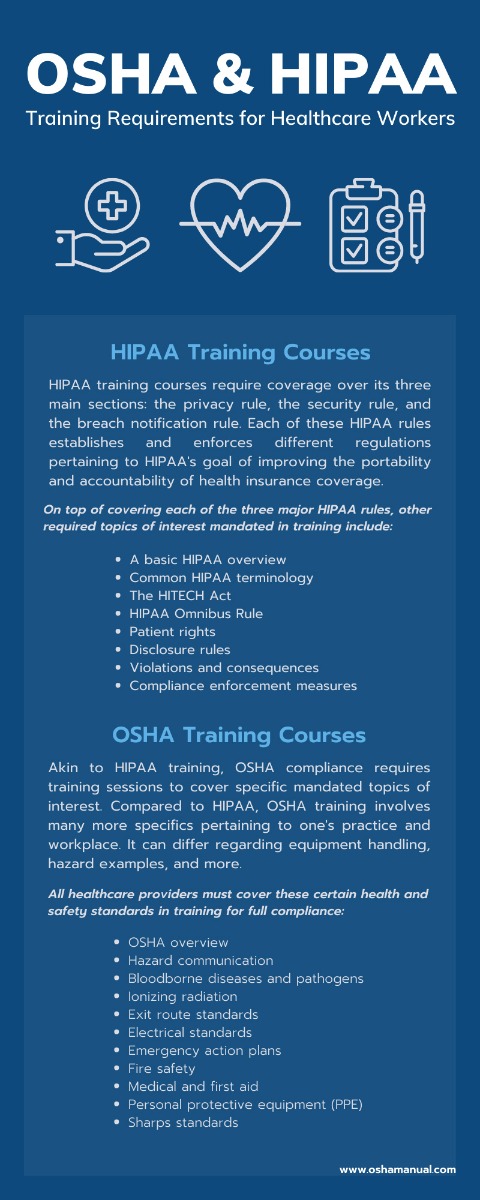
In order to ensure the safety of your practice and patients, certain laws come into play. As a healthcare practice, whether you are a dental office or medical practice, HIPAA and OSHA compliance are the two main regulations that affect your business. Both regulations enforce and establish set safety standards, ranging from building a healthy workplace to securing important sensitive data.
OSHA compliance focuses on your employees. It creates and encourages businesses to practice certain health and safety protocols. OSHA compliance ensures your business operates smoothly, functions ethically, and keeps all parties involved healthy and safe. HIPAA enforces and establishes standards related to a patient's protected health information (PHI). It covers patient privacy and security, as well protocols for handling consent over information, sharing data, electronic portability, and sensitive information security.
OSHA and HIPAA compliance plays an important part in ensuring your service is ethical, successful, and optimized. As part of the compliance process, HIPAA and OSHA require training, which comes with its own set of mandates to meet. Here is a breakdown of OSHA and HIPAA training requirements for healthcare workers.
HIPAA Training Courses
HIPAA training courses require coverage over its three main sections: the privacy rule, the security rule, and the breach notification rule. Each of these HIPAA rules establishes and enforces different regulations pertaining to HIPAA's goal of improving the portability and accountability of health insurance coverage. It sets standards for balancing the security of one's PHI with optimized health services. It also ensures the security of sensitive data while still giving providers the necessary information for maximized care. On top of covering each of the three major HIPAA rules, other required topics of interest mandated in training include:
- A basic HIPAA overview
- Common HIPAA terminology
- The HITECH Act
- HIPAA Omnibus Rule
- Patient rights
- Disclosure rules
- Violations and consequences
- Compliance enforcement measures
These topics cover the basic requirements of HIPAA compliance and mandatory subjects for training. Training that doesn't cover the three main rules and other basic topics does not meet the requirements for HIPAA compliance. Even if you choose to opt for a HIPAA online training course over an in-person session, no matter the type of training, all basic topics must be covered. Covering the required basics qualifies you for compliance and successfully optimizes the safety of your patients and the success of your medical practice.
OSHA Training Courses
Akin to HIPAA training, OSHA compliance requires training sessions to cover specific mandated topics of interest. Compared to HIPAA, OSHA training involves many more specifics pertaining to one's practice and workplace. It can differ regarding equipment handling, hazard examples, and more. However, all healthcare providers must cover these certain health and safety standards in training for full compliance:
- OSHA overview
- Hazard communication
- Bloodborne diseases and pathogens
- Ionizing radiation
- Exit route standards
- Electrical standards
- Emergency action plans
- Fire safety
- Medical and first aid
- Personal protective equipment (PPE)
- Sharps standards
Aside from the basic topics, compliant OSHA training must include certain other safety protocol aspects and attributes. According to the department of labor, OSHA training should include posters, record-keeping means and lessons, electronic injury and illness submission data, safety plan mockups, and reporting methods and topic coverage.
Compliance Training Frequency
To ensure all workplaces stay compliant and up to date with the best health and safety protocols, the department of labor requires businesses to undergo OSHA training annually. Yearly training goes over the same basics. They only change topics to cover new or updated laws.
HIPAA enforces businesses to train frequently and undergo periodic refreshers. They do not explicitly say or require businesses to retrain annually. However, annual HIPAA training is highly recommended and offers numerous benefits. Regular training keeps everyone in the loop with recent protocols and ensures people stay reminded of the best practices. It ensures employees stay compliant, minimizing any breaches or risks.
Certification and Evaluation Requirements
Part of the training requirement for OSHA and HIPAA involves certifications and follow-up evaluations. Compliance with either regulation consists of four major parts: training, certification, implementation, and an assessment. An approved and official OSHA and HIPAA training course will award you a certification of completion, which can be shown to an OSHA or HIPAA auditor in the event of an assessment. During their inspection, the assessors review the training certification and other necessary documents to ensure your compliance with set protocols. The risk assessments also uncover what you as a business learned in training.
Other Important Training Requirements
Other important training requirements for both HIPAA and OSHA include protocols on who needs to undergo training, when training should occur, timing, and other mandates.
Who Is Required To Train?
Both regulations may require all employees within your practice to train. Whether an employee works the front desk or is the lead doctor, all employees must endure compliance training for OSHA. Similarly, all employees interacting with patients' PHI or working in a space that handles PHI are mandated to train for HIPAA compliance.
When Should Training Occur?
Training should occur fairly soon after a new hire officially joins. Delaying training can result in breaches and other hazards and violations. For OSHA compliance, once a new employee is hired, training must be completed within 10 days. For HIPAA compliance, employees must undergo retraining periodically throughout their time at the clinic after the initial training.
Training Time Requirements
HIPAA and OSHA training courses do not need to be of a certain duration in order to comply. Ensuring training covers the mandatory topics holds more importance than meeting a specific time in training. Finding a balance between comprehensive training and not dragging out the sessions provides the most beneficial courses. An ideal course avoids short, inefficient training sessions and long, arduous courses.
Other Mandatory Training Attributes
Other training requirements and attributes that enhance or change one’s training and ensure compliance includes:
- Interactive sessions.
- Examples of protocols in use or scenarios.
- Specific equipment outlines and safety protocols.
- CDC implemented regulations (i.e. covid preparedness).
No matter the type of clinic you operate or the service you provide, all healthcare workers are mandated to undergo HIPAA and OSHA training. Both training sessions come with their own requirements that ensure your compliance with the regulations. Making sure you meet all training requirements increases your chances of successful compliance, general success as a business, and other benefits, from improving patient and doctor relationships to better performance and ethical practices. Before you jump into training, make sure your courses meet all the necessary requirements and ensure your healthcare business stays compliant and optimized for success.


